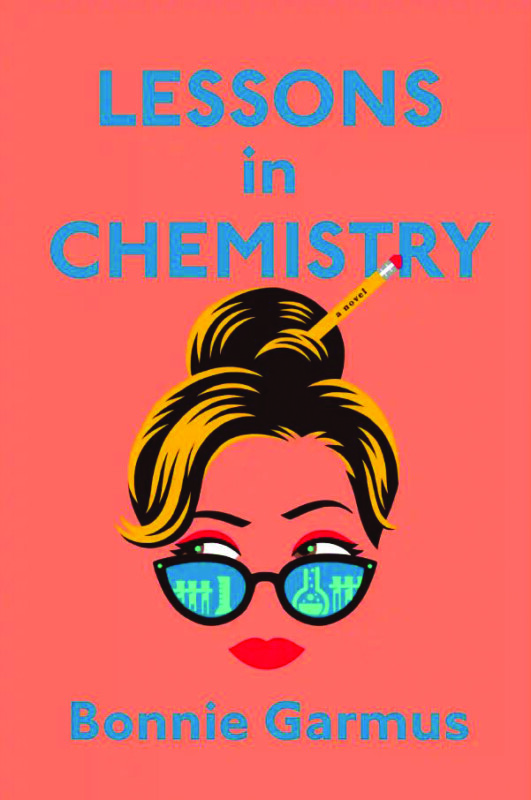Lessons in Chemistry, by Bonnie Garmus (Doubleday, 386 pages)
There are a lot of things to appreciate about this debut novel from Bonnie Garmus: The story is original, the writing is engaging and the cast of characters is mainly quirky and fun. Well, except for most of the men. And therein lies one of the problems with this book.
Lessons in Chemistry is fiercely devoted to the idea that women in 1960s California were treated entirely unfairly and had no opportunities for careers outside of the home, and that men were generally awful humans who had zero respect for women and were successful only because they were born male.
The book centers on chemist Elizabeth Zott, who works with an otherwise all-male team at Hastings Research Institute, where she doesn’t feel her work is respected. Prior to that job, Elizabeth was trying to get her Ph.D. but was sexually assaulted and kicked out of the program after defending herself with what must have been a pretty sharp pencil. So she has a particularly strong point of view about the male species and equality. Fair.
“Elizabeth Zott held grudges … mainly reserved for a patriarchal society founded on the idea that women were less. Less capable. Less intelligent. Less inventive. A society that believed men went to work and did important things … and women stayed at home and raised children.”
But then she meets Calvin Evans, a renowned scientist who appreciates Elizabeth’s intelligence and passion for the sciences. His character is reminiscent of The Big Bang Theory’s Sheldon Cooper, with his academic genius far superior to his emotional intelligence and ability to understand human behavior and societal norms. But he is a champion of Elizabeth almost from the start, despite her oft-exaggerated views on life.
“‘You’re saying,’ he said slowly, ‘that more women actually want to be in science.’
She widened her eyes. ‘Of course we do. In science, in medicine, in business, in music, in math. Pick an area.’ And then she paused, because the truth was, she’d only known a handful of women who’d wanted to be in science or any other area for that matter. Most of the women she’d met in college claimed they were only there to get their MRS. It was disconcerting, as if they’d all drunk something that had rendered them temporarily insane.
‘But instead,’ she continued, ‘women are at home, making babies and cleaning rugs. It’s legalized slavery.’”
Not to be too dramatic or anything.
Elizabeth has self-righteous tendencies and can be annoying at times. There are some contradictions in the book too; Elizabeth spends so much time talking about how she deserves equality, yet she ends her cooking show, Supper at Six, with “Children, set the table. Your mother needs a moment to herself.” So fathers can’t be home cooking? If the point here is equality, shouldn’t it work both ways?
Still, Elizabeth as host of the show is one of the author’s more clever moves; Elizabeth takes the job begrudgingly when life seems to leave no other option, and she uses it as a forum to bolster the spirits and promote the intelligence of the housewives who are watching. She uses scientific formulas in her recipes and encourages women to do more and be more. The problem is, she isn’t likable (in my opinion — as of this writing, the book has a 4.4-star review on Goodreads, so I’m not necessarily in the majority here). I had a hard time believing that anyone would watch her show; she comes across as smart, yes, but not personable. She speaks like the scientist she is, and it’s not relatable dialogue. No one who is not a scientist — man or woman — would know what she’s talking about most of the time, and it’s not like Google existed back then to figure it out.
The book’s other “lesson in chemistry” — the chemistry between Elizabeth and Calvin — is short-lived. Their relationship was the highlight of the story to me, but it ends abruptly, and the plot disappointingly transitions to its heavy-hitting feminist focus. Calvin’s character becomes less about his impact on Elizabeth’s life and more about a convoluted subplot regarding his family history, an adoption mystery and the funding of scientists.
There are some fascinating characters, like Elizabeth and Calvin’s daughter Mad, and Mad’s babysitter Harriet, both of whom add depth and refreshingly different points of view to the book. And then there’s Six-Thirty, Elizabeth and Calvin’s dog, who learns to understand hundreds of words that Elizabeth teaches him. I appreciate the purpose of that message — anyone, and any dog, can do anything! — in the context of this book, and it’s mostly delivered well, through the eyes of other characters, like Elizabeth (who thinks it just makes sense that a dog could learn any words) or Harriet (who thinks Elizabeth is strange). But there are a few random, abrupt moments in the book where we’re seeing things from Six-Thirty’s point of view, and I found it a bit off-putting. His perspective didn’t seem to add anything to the story and, to me, it just slowed down the flow.
Ultimately, I enjoyed the first half of the book. The second half was missing, well, chemistry. Elizabeth is a better character alongside Calvin, which is likely the opposite of what Garmus was aiming for, her message seemingly being that women don’t need men. That message might have gone over better if Elizabeth were the least bit happy and hadn’t been described in the first few pages of the book as “permanently depressed” and “ashamed” of her job as a TV host — it’s hard to cheer for a bitter “hero.” C+ — Meghan Siegler
Book Notes
Nora Ephron’s most famous films were When Harry Met Sally and Sleepless in Seattle, but it was Heartburn, not insomnia, that made her famous.
A novel loosely based on her breakup with Carl Bernstein of Watergate fame, Heartburn (Knopf, 179 pages) was made into a movie starring Meryl Streep and began the transformation of Ephron from journalist to screenwriter and director, although she never stopped writing books. Her 2006 book of essays, I Feel Bad About My Neck (Knopf, 137 pages), was a droll reflection on aging.
Ephron would be pleased that her neck is concealed in the photo on the cover of the new book about her life. Nora Ephron, a Biography (Chicago Review Press, 304 pages) is by Kristin Marguerite Doidge, a journalist who combed through Ephron’s own writing and interviewed colleagues such as Tom Hanks and Martin Short.
Meanwhile, the ex who inadvertently launched Ephron’s Hollywood career published his own memoir this year: Chasing History, a Kid in the Newsroom (Henry Holt & Co., 384 pages). His work with Woodward at The Washington Post resulted in the 1974 book and subsequent film All The President’s Men, which was consequential in bringing down a president, Richard Nixon.
Incredibly, it’s the 50th anniversary of the Watergate scandal (although Nixon didn’t resign until 1974), which means that Woodward and Bernstein are making the rounds on news shows. There’s also a new history of Watergate called, quite redundantly, Watergate, a New History (Avid Reader Press, 832 pages) by Garrett Graff.
Did we need a new Watergate history? “The answer turns out to be yes,” writes Len Downie Jr., but he’s a former Washington Post editor, so take that with a grain of salt.
Meanwhile, if you’d rather not revisit the Nixon years, go back even further in time to The Monster’s Bones (W.W. Norton, 288 pages), promising nonfiction by David K. Randall. It’s about the discovery of the first T-rex skeleton in Hellcreek, Montana, in 1902, and how this fueled our fascination with dinosaurs — and natural history museums. —Jennifer Graham
Book Events
Author events
• PAUL DOIRON Author presents Hatchet Island. Gibson’s Bookstore, 45 S. Main St., Concord. Wed., June 29, 6:30 p.m. Visit gibsonsbookstore.com or call 224-0562.
• PAUL BROGAN Author presents A Sprinkling of Stardust Over the Outhouse. Gibson’s Bookstore, 45 S. Main St., Concord. Thurs., June 30, 6:30 p.m. Visit gibsonsbookstore.com or call 224-0562.
• SARAH MCCRAW CROW Author presents The Wrong Kind of Woman. Gibson’s Bookstore, 45 S. Main St., Concord. Tues., July 19, 6:30 p.m. Visit gibsonsbookstore.com or call 224-0562.
• CASEY SHERMAN Author presents Helltown. Bookery, 844 Elm St., Manchester. Sun., Aug. 14, 1:30 p.m. Visit bookerymht.com or call 836-6600.
Poetry
• DOWN CELLAR POETRY SALON Poetry event series presented by the Poetry Society of New Hampshire. Monthly. First Sunday. Visit poetrysocietynh.wordpress.com.
Writers groups
• MERRIMACK VALLEY WRITERS’ GROUP All published and unpublished local writers who are interested in sharing their work with other writers and giving and receiving constructive feedback are invited to join. The group meets regularly Email pembrokenhtownlibrary@gmail.com.
Book Clubs
• BOOKERY Monthly. Third Thursday, 6 p.m. 844 Elm St., Manchester. Visit bookerymht.com/online-book-club or call 836-6600.
• GIBSON’S BOOKSTORE Online, via Zoom. Monthly. First Monday, 5:30 p.m. Bookstore based in Concord. Visit gibsonsbookstore.com/gibsons-book-club-2020-2021 or call 224-0562.
• TO SHARE BREWING CO. 720 Union St., Manchester. Monthly. Second Thursday, 6 p.m. RSVP required. Visit tosharebrewing.com or call 836-6947.
• GOFFSTOWN PUBLIC LIBRARY 2 High St., Goffstown. Monthly. Third Wednesday, 1:30 p.m. Call 497-2102, email elizabethw@goffstownlibrary.com or visit goffstownlibrary.com
• BELKNAP MILL Online. Monthly. Last Wednesday, 6 p.m. Based in Laconia. Email bookclub@belknapmill.org.
• NASHUA PUBLIC LIBRARY Online. Monthly. Second Friday, 3 p.m. Call 589-4611, email information@nashualibrary.org or visit nashualibrary.org.
Language
• FRENCH LANGUAGE AND LITERATURE CLASSES
Offered remotely by the Franco-American Centre. Six-week session with classes held Thursdays from 6:30 to 8:30 p.m. $225. Visit facnh.com/education or call 623-1093.






